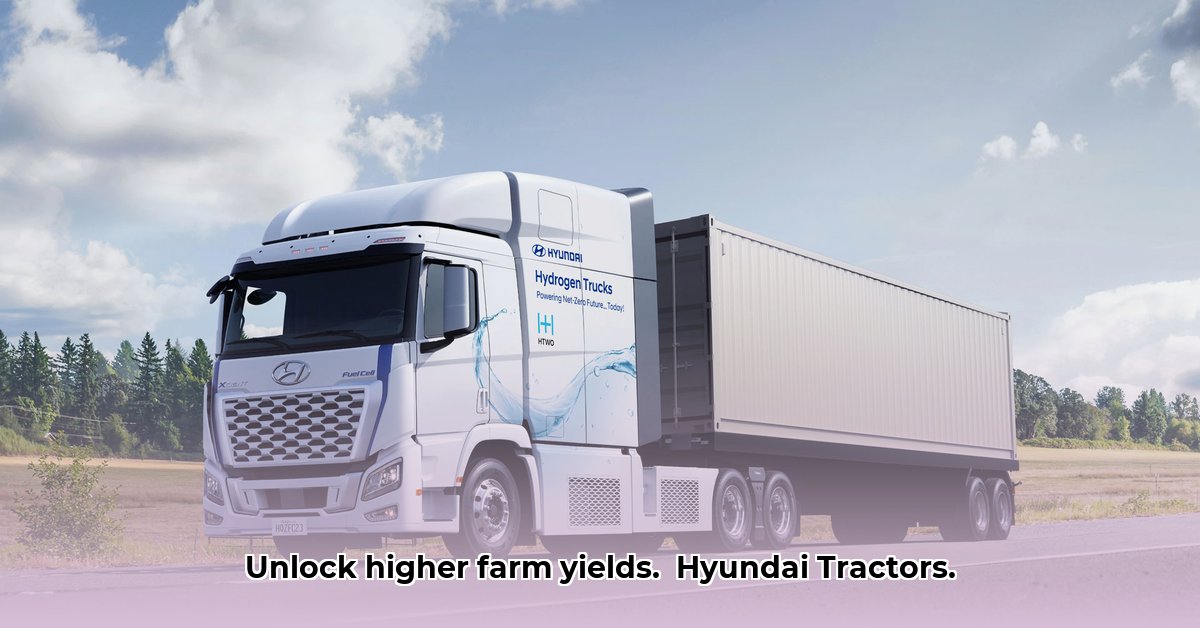
Hyundai Tractor: Enhancing Farm Productivity and Sustainability
Hyundai is increasingly recognized within the agricultural machinery sector for its commitment to efficiency and sustainability. This article examines how Hyundai tractors contribute to improved farm yields and reduced operational costs, exploring key features, analyzing potential efficiency gains, and outlining actionable steps for various stakeholders. We will also address existing data gaps and discuss future directions for sustainable agricultural technology. To help determine the right size tractor for your needs, check out this helpful guide: Tractor Sizing Guide.
Power and Precision: Key Features of Hyundai Tractors
Hyundai tractors incorporate several advanced features designed to optimize farming operations. The dual-axle coupler (a system connecting the tractor's axles) significantly enhances load stability during transport, minimizing spillage and maximizing efficiency. This translates directly into reduced waste and increased profitability. The Hi MATE remote management system provides real-time monitoring and control, allowing for adjustments mid-operation, minimizing downtime and optimizing performance. Many models also integrate GPS-guided steering, further enhancing precision and reducing fuel consumption by minimizing overlapping passes. These sophisticated features contribute to a more efficient and productive farming workflow. How much more efficient? While precise yield increase data is still under collection, the reduced risk of spillage alone represents a substantial benefit.
Efficiency and Productivity Gains: Quantifying the Impact
While comprehensive yield data specific to Hyundai tractors requires further research, several features indicate significant potential for increased productivity and reduced operational costs. The improved load stability offered by the dual-axle coupler directly minimizes product loss, a considerable advantage. The precision of GPS-guided steering and the real-time control offered by Hi MATE directly translate to reduced fuel consumption and minimized operational time. Ongoing research is crucial to quantifying these improvements with precise metrics. The early indicators are compelling, suggesting substantial improvements in efficiency and ROI. What are the key factors hindering the collection of this data? Further research and standardized testing protocols are needed to address this critical gap.
Sustainability Aspects: Environmental Impact and Future Improvements
Sustainability in agriculture is paramount. Currently, comprehensive data on the overall environmental impact of Hyundai tractors is limited. Independent lifecycle assessments (LCAs) are necessary to fully understand the environmental footprint—from manufacturing to disposal. This assessment should encompass greenhouse gas emissions, fuel efficiency, and the use of sustainable materials in manufacturing. Identifying areas for improvement in these areas is critical for responsible agricultural technology development. This includes exploring more sustainable materials, improving engine efficiency, and designing for reduced waste.
Actionable Insights for Stakeholders: Recommendations for Success
Successful implementation of sustainable agricultural technologies necessitates collaboration among key stakeholders:
Hyundai: Conduct and publicly release independent LCAs; invest heavily in R&D for electric or hybrid models; champion sustainable sourcing and production methods; and partner with universities and research institutions to address knowledge gaps.
Farmers: Evaluate the ROI of Hyundai tractors, factoring in both short and long-term cost savings and efficiency gains; explore integrating precision agriculture technologies; monitor fuel consumption and environmental impacts; and adopt sustainable farming practices alongside tractor use.
Policy Makers: Encourage transparent reporting of environmental performance data from all agricultural machinery manufacturers; establish clear sustainability standards; and create incentive programs to encourage adoption of sustainable technologies..
Challenges and Future Directions: Navigating the Evolving Landscape
The agricultural machinery market is highly competitive. Hyundai faces challenges in competing with established brands and adapting to rapid technological changes. However, opportunities abound. Future research and development should focus on AI-powered optimization systems that adjust settings based on real-time field conditions, and the development of fully electric or hybrid models to significantly reduce emissions. Transparency and ongoing investment in R&D will be critical for Hyundai’s success and the advancement of sustainable agriculture.
Conclusion: Driving Towards a Sustainable Future in Farming
Hyundai tractors offer considerable potential for increasing farm yields and reducing operational costs. While data on precise efficiency gains is still under development, the features described suggest significant improvements. A collaborative effort among Hyundai, farmers, and policymakers is crucial to address data gaps, accelerate the adoption of sustainable practices, and shape a more environmentally responsible future for agriculture. The continuous pursuit of innovation and transparency is essential for achieving long-term sustainability within the agricultural sector.